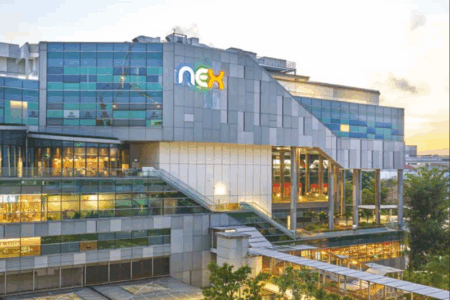Decline in share prices is normal; the late Charlie Munger argues that big drawdowns are a price to pay for super long-term returns.
Even when the underlying fundamentals are solid, temporary pullbacks can occur to blue-chip companies due to short-term headwinds.
Here, we focus on three such Singapore blue-chip stocks that have lagged the Straits Times Index (SGX: ^STI), up by nearly 18% year-to-date (YTD), but may recover if sentiment turns.
SATS Limited (SGX: S58): The Market Is Not Giving Enough Credit to Its Turnaround
SATS Limited, or SATS, is down by more than 5% YTD.
Global trade disruptions have weighed on sentiment and earnings expectations.
SATS has also been digesting its mega acquisition (completed on 3 April 2024) of Worldwide Flight Services (WFS), which has raised the debt levels on the company’s balance sheet.
These factors may have caused the stock’s underperformance.
However, it might be time for SATS to take off.
In the first quarter of the fiscal year ending 31 March 2026 (Q1FY2026), SATS’s revenue grew 10% year-on-year (YoY) to S$1.51 billion.
The topline growth is accompanied by solid net profit growth of 9.1% YoY to S$70.9 million, on the back of record cargo volumes and higher yields.
This continues the solid earnings recovery of the past two years, where net income turned from a loss of S$26.5 million in FY2023 to almost S$244 million for FY2025.
Meanwhile, debt-to-equity (D/E) is stable compared to a year ago at 1.5 times.
Since reinstating the dividend for FY2024 (S$0.03 per share), SATS has sharply raised its payout to S$0.10 per share in its latest annual payout.
With cargo and passenger flow expected to remain strong, management is confident in the near-term prospects of the business.
These are the tailwinds, alongside management’s proven ability to execute well and grow profits, that could lead the stock higher.
Thai Beverage Public Company Limited (SGX: Y92): Alcohol Giant Trading at Multi-Year Lows
Thai Beverage, or ThaiBev, is down by close to 14% YTD.
Softer domestic demand, alongside the tariff-induced uncertainty, inflationary costs, and an unstable Thai political climate, may be behind the stock’s underperformance.
What about the business?
Revenue for the second quarter of the fiscal year ending 30 September 2025 (2QFY2025) was relatively flat compared to a year ago.
Compared to a year ago, sales volumes rose with spirits and beer both posting a 2.6% YoY gain each while NAB eked out a 0.9% increase over the past year.
Net profit contracted 11.8% owing to soft performance from its Spirits business, lower share of profit from associates and joint ventures for its non-alcoholic business (NAB), and higher operating costs.
Here’s the rub: net income has been declining since FY2023.
Despite that, ThaiBev has maintained a dividend per share of THB 0.15.
In the past five years, dividends have never been cut, only maintained.
Gearing remains stable at 1.32 times.
Thus, despite the mixed results, there are reasons to be optimistic about ThaiBev fundamentals given the strong brands in its beer (Chang, Saigon Beer) and its food portfolios (Oishi Group restaurants, KFC in Thailand).
At its annual meeting in June 2025, Thai Bev management said that it is still open to spinning off and listing its regional beer business.
This move could lead to an improved valuation for ThaiBev as its beer business gets more fairly valued as a stand-alone business, given its strong branding.
ThaiBev trades at a trailing price-to-earnings (P/E) ratio of around 11 times, a steep discount compared to its 10-year average P/E of 16.8 times.
ThaiBev also has a sustainable dividend yield of 5%.
Any progress in tariff negotiations or any move to monetise its assets could lead to a sharp rally.
Wilmar International Limited (SGX: F34): Strong Operating Performance Marred by Indonesia Cooking Oil Case
Wilmar grows and processes palm oil, grains, and sugar, and turns them into everyday food products, speciality fats, biodiesel and fertilisers.
The stock is only up 5.5% YTD, trailing the STI.
The overhang of the case involving Indonesian cooking oil export permits, where Wilmar was charged with paying a large fine of S$725 million, may have contributed to its share price underperformance.
But beneath the hood, the business is still humming along.
Revenue of US$19.1 billion for 2025’s third quarter (3Q2025) rose 7.4% YoY.
Core net profit rose 71.6% to US$357.2 million, helped by higher volumes in its Food Products segment and its Oils and Grains sub-segment under the Feed and Industrial Products segment.
Refining margins were also higher than expected.
Wilmar’s latest interim dividend of S$0.040 per share represents a slight cut compared to the previous year’s S$0.060 per share.
Wilmar has a stellar dividend-paying record, having paid an annual dividend since 2006.
Net gearing ratio for Wilmar is manageable at 0.82 times, with available banking facilities of US$36.9 billion.
While net income has been on the decline since 2023, this recent quarter’s return to growth for core earnings could be a prelude to stronger earnings moving forward.
Management is cautiously optimistic that positive business momentum will persist to the end of the year.
With its Indonesian legal issue in the rear-view mirror, the stock should finally rally in accordance with its strong operating performance.
What to Look for in a Comeback Blue-Chip
Underperformance compared to the STI does not make a stock an automatic buy.
Focus on names with improving fundamentals, strong cash flow, and management execution.
Have a checklist to identify if the company has manageable debt levels, cash flow generating ability, and identifiable catalysts.
Past precedents show blue-chip stocks rebounding strongly after temporary headwinds.
The most probable comeback stories are due to fundamentals:
| Company | SATS Ltd | Thai Beverage | Wilmar International |
| YTD stock price performance | Down 5% | Down 14% | Up 5.5% |
| Dividend Yield | 1.5% | 5% | 4.3% |
| Potential Catalysts | Continued recovery in cargo and passengers Growth in Net Profits & Cash Flows | Spin-off + listing of regional beer business Recovery in consumer demand/sentiment Progress in tariff negotiations | Overhang of Indonesian case overContinuous strong execution |
Note: Share prices as of last Thursday
What This Means for Investors
The depressive mood swings of Mr Market can create buying opportunities for patient, long-term investors.
However, one has to differentiate whether the company is facing structural issues or just temporary headwinds.
You can ride the wave of recovery by buying quality blue-chips at discounted prices.
Get Smart: Consider Owning These Quality Blue-Chip Stocks That Could Re-Rate Higher
Even great companies sell off during tough times — but quality always wins out in the end.
Stay calm, do your homework, and look for quality companies when everyone is selling them.
First-time investors: We’ve finally released our Beginner’s Guide. Read it in an afternoon, follow the principles, pick an investing style and buy your first SGX stocks within the next few hours! Click here to download it for free.
Follow us on Facebook, Instagram and Telegram for the latest investing news and analyses!
Disclosure: Wesley does not own shares in any of the companies mentioned.





